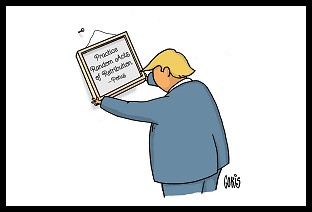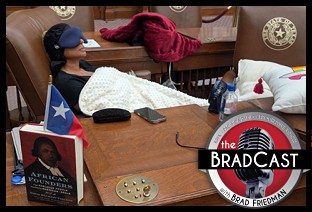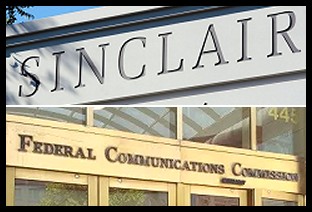 North Carolina counties which use touch-screen voting systems will now have to post a "Voter Alert" at precincts warning voters about potential problems with the machines following a complaint [PDF] filed in federal court by the state's Republican Party on Friday. The lawsuit, heard today on an expedited basis, was filed after voters in several counties had reported to party officials that their attempts to vote for straight-ticket Republican ballots were flipping on the screen to straight-ticket Democratic ballots.
North Carolina counties which use touch-screen voting systems will now have to post a "Voter Alert" at precincts warning voters about potential problems with the machines following a complaint [PDF] filed in federal court by the state's Republican Party on Friday. The lawsuit, heard today on an expedited basis, was filed after voters in several counties had reported to party officials that their attempts to vote for straight-ticket Republican ballots were flipping on the screen to straight-ticket Democratic ballots.
Those reports of vote-flipping led to the NC GOP issuing a threat late this week to sue the State Board of Elections (BoE) if their demands were not met to order certain precautions be taken at polling places which used the 100% unverifiable Direct Recording Electronic (DRE, usually touch-screen) voting systems. After the Executive Director for the BoE sent a letter in response to the GOP's demands, downplaying the reported incidents as "isolated" and "no different than ones that must be addressed in every election," the Republican complaint was filed in federal court on Friday afternoon. (The sharp letters back and forth between the state GOP and BoE can be read in our previous report on the NC situation.)
Judge Malcolm Howard tonight also ordered that pollworkers must tell voters to read the printed alert, and that memory cards and other programming materials, records and audit logs from the oft-failed ES&S iVotronic touch-screen DREs must be preserved for examination after the election. Late today, the BoE Executive Director Gary O. Bartlett sent a notice [PDF] to the County Boards of Elections detailing the changes ordered by the federal judge.
The "Voter Alert" to be posted in all precincts using the touch-screen voting systems must read as follows...

See News 14's coverage here and coverage from local NBC affiliate WITN here for more details.
The remedies sought, and gained, by the Republicans, however, fail to address the fact that no matter how "carefully" a voter reviews their on-screen ballot to ensure their "vote is accurately cast", there is still no way to know that the voting system will record those votes as intended. Moreover, there is no way to know after the election whether the results actually reflect the will of the electorate, as we recently discussed in this article at Slate detailing some of the closest and most-watched races in the nation which will likely be determined on identical or similar 100% unverifiable DRE systems next Tuesday.
Removing systems from service once they are reported to be failing would be the safest way to deal with such problems, but long time North Carolina Election Integrity advocate Joyce McCloy, Director of NC Coalition for Verified Voting and editor of Voting News, explained to The BRAD BLOG tonight that many of the state's counties wouldn't have enough machines or back-up paper ballots to handle the election if failing machines were removed from service.
In past elections, most notably in both 2006 and 2008, it has been largely Democratic voters who have complained that their attempted touch-screen votes were seen flipping to Republican (or other party's) candidates. Little action was taken on their behalf by either elections officials or the Democratic Party. Many of those who complained were tarred as being being "conspiracy theorists" or "sore losers" by Republicans, and both elections officials and voting machine company representatives generally marginalized the complaints as either non-existent or "human error" on the part of the voter.
According to the NC GOP's attorney Tom Farr, similar arguments were made by the BoE in this morning's proceedings. "What I heard in the argument today was, the problem with the touchscreen voting machines are the fault of the voters, not the State Board and we have to preserve the integrity of the State Board and its reputation. And that's more important than making sure that voters had their ballots counted accurately, and that's what I thought was outrageous," Farr told the media after the court hearing.
Another report of votes flipping from Republican to the Green Party on a straight-ticket ballot, as caught on cellphone video, occurred last week in Texas (along with a report of another voter who saw his vote flip from Democratic to Republican in a different TX county.) In Nevada a Republican voter claimed her touch-screen vote was pre-selected on screen for Sen. Harry Reid in his tight race against Republican Sharron Angle. In both instances, local election officials downplayed the incidents by blaming the voters.
Such occurrences have marred virtually every election since the proliferation of unverifiable touch-screen voting was enabled by the federal Help America Vote Act (HAVA) of 2002. While many jurisdictions have decertified the systems in favor of paper ballot-based optical-scan systems, some 20 to 30% of the nation's voters still use DREs at the polling place.
McCloy told The BRAD BLOG this evening that the state had been set to ban DRE systems all together some time ago, until the legislation was scotched after apparent lobbying by election officials in counties who use, and very much like, the systems. Afterwords, the legislation was reportedly modified to allow the touch-screen systems to stay in place.
ES&S voting systems have a storied history of failure. In 2006, the iVotronics were found to have inexplicably failed to record some 18,000 votes in a special election for the U.S. House in Florida (in which the Republican candidate was declared the "winner" by just 369 votes). That incident led to the state getting rid of virtually all of their touch-screen systems. ES&S iVotronics were also used at the polling place for South Carolina's primary where Alvin Greene, the unemployed South Carolina veteran who failed to campaign or even have a campaign web site, inexplicably defeated four-term state Senator and former Circuit Court Judge Vic Rawl for the Democratic U.S. Senate nomination.
In Monroe County, Arkansas, in the days following their May 18th U.S. Senate primary this year, thousands of votes said to have been tallied on the night of the election promptly disappeared from the ES&S system in the days following it. Neither state nor local officials have been able to explain what happened or why.
In addition to North Carolina, ES&S iVotronic touch-screens are still used by voters in Arkansas, Washington D.C., Florida, Indiana, Kansas, Kentucky, Missouri, Mississippi, New Jersey, Ohio, Pennsylvania, South Carolina, Tennessee, Texas, Virginia, Wisconsin, and West Virginia.
• The BRAD BLOG's recently related coverage concerning NC vote-flipping:
10/23/10: Touch-Screens in Two NC Counties Flip Straight-Party Votes Repeatedly from GOP to Dem
10/28/10: NC GOP Files Suit Over 'Widespread' Touch-screen Failures, Votes Flipping to Dems
• Other BRAD BLOG reports of votes flipping away from Republicans this year:
10/22/10: Video Shows Touch-Screen Voting Machine Purportedly Flipping Vote From Republican Perry to Green Party Candidates in Dallas County, TX
10/26/10: E-Vote Trouble in NV


 Sunday 'Random Acts of' Toons
Sunday 'Random Acts of' Toons From CA's 'Nuclear Deterrence' Map to Newsom's Trolling to Trump's 'Fascist Theatre' and Beyond: 'BradCast' 8/21/25
From CA's 'Nuclear Deterrence' Map to Newsom's Trolling to Trump's 'Fascist Theatre' and Beyond: 'BradCast' 8/21/25 'Green News Report' 8/21/25
'Green News Report' 8/21/25
 On 'Americanism' and Trump's 'Stalinesque' Plot to Whitewash U.S. History: 'BradCast' 8/20/25
On 'Americanism' and Trump's 'Stalinesque' Plot to Whitewash U.S. History: 'BradCast' 8/20/25  Texas GOP Imprisons Dem State Lawmaker in State House Chamber: 'BradCast' 8/19/25
Texas GOP Imprisons Dem State Lawmaker in State House Chamber: 'BradCast' 8/19/25 'Green News Report' 8/19/25
'Green News Report' 8/19/25 Trump, Nazis and
Trump, Nazis and  Sunday '
Sunday ' Newsom's 'Election Rigging Response Act'; FCC's License Renewal for Sock-Puppeting Sinclair: 'BradCast' 8/14/25
Newsom's 'Election Rigging Response Act'; FCC's License Renewal for Sock-Puppeting Sinclair: 'BradCast' 8/14/25 'Green News Report' 8/14/25
'Green News Report' 8/14/25 140 New House Reps?: Moving Beyond the Gerrymandering Wars: 'BradCast' 8/13/25
140 New House Reps?: Moving Beyond the Gerrymandering Wars: 'BradCast' 8/13/25 FCC Renews Sinclair TV Licenses Despite Complaint from Petitioner Who Died Waiting
FCC Renews Sinclair TV Licenses Despite Complaint from Petitioner Who Died Waiting It's Not About the Rule of Law, It's About Authoritarian Control: 'BradCast' 8/12/25
It's Not About the Rule of Law, It's About Authoritarian Control: 'BradCast' 8/12/25 'Green News Report' 8/12/25
'Green News Report' 8/12/25 After Vaccine Cancels, CDC Shooting, Former Officials Want RFK Out: 'BradCast' 8/11/25
After Vaccine Cancels, CDC Shooting, Former Officials Want RFK Out: 'BradCast' 8/11/25 Sunday 'All's Well' Toons
Sunday 'All's Well' Toons 'Green News Report' 8/7/25
'Green News Report' 8/7/25 Trump Wars Against Greem Energy, Democracy on VRA's 60th: 'BradCast' 8/7
Trump Wars Against Greem Energy, Democracy on VRA's 60th: 'BradCast' 8/7 Media Conglomerates Continue Trump Capitulation: 'BradCast' 8/6/25
Media Conglomerates Continue Trump Capitulation: 'BradCast' 8/6/25 Banana Republican: Trump Shoots the Labor Statistics Messenger: 'BradCast' 8/5/25
Banana Republican: Trump Shoots the Labor Statistics Messenger: 'BradCast' 8/5/25 All's Fair in Love, War and, Apparently, Part-isan Gerrymandering: 'BradCast' 8/4/25
All's Fair in Love, War and, Apparently, Part-isan Gerrymandering: 'BradCast' 8/4/25 The Art of the Corrupt, Phony, Unlawful, Pretend Trade Deal: 'BradCast' 7/31/25
The Art of the Corrupt, Phony, Unlawful, Pretend Trade Deal: 'BradCast' 7/31/25 Battle Begins Against Trump EPA Climate Regulations 'Kill Shot': 'BradCast' 7/30/25
Battle Begins Against Trump EPA Climate Regulations 'Kill Shot': 'BradCast' 7/30/25 A Pu Pu Platter of Trump Corruption: 'BradCast' 7/29/25
A Pu Pu Platter of Trump Corruption: 'BradCast' 7/29/25 'Catastrophic' GOP Cuts to Medicaid, Medicare, ACA: 'BradCast' 7/28/25
'Catastrophic' GOP Cuts to Medicaid, Medicare, ACA: 'BradCast' 7/28/25
 VA GOP VOTER REG FRAUDSTER OFF HOOK
VA GOP VOTER REG FRAUDSTER OFF HOOK Criminal GOP Voter Registration Fraud Probe Expanding in VA
Criminal GOP Voter Registration Fraud Probe Expanding in VA DOJ PROBE SOUGHT AFTER VA ARREST
DOJ PROBE SOUGHT AFTER VA ARREST Arrest in VA: GOP Voter Reg Scandal Widens
Arrest in VA: GOP Voter Reg Scandal Widens ALL TOGETHER: ROVE, SPROUL, KOCHS, RNC
ALL TOGETHER: ROVE, SPROUL, KOCHS, RNC LATimes: RNC's 'Fired' Sproul Working for Repubs in 'as Many as 30 States'
LATimes: RNC's 'Fired' Sproul Working for Repubs in 'as Many as 30 States' 'Fired' Sproul Group 'Cloned', Still Working for Republicans in At Least 10 States
'Fired' Sproul Group 'Cloned', Still Working for Republicans in At Least 10 States FINALLY: FOX ON GOP REG FRAUD SCANDAL
FINALLY: FOX ON GOP REG FRAUD SCANDAL COLORADO FOLLOWS FLORIDA WITH GOP CRIMINAL INVESTIGATION
COLORADO FOLLOWS FLORIDA WITH GOP CRIMINAL INVESTIGATION CRIMINAL PROBE LAUNCHED INTO GOP VOTER REGISTRATION FRAUD SCANDAL IN FL
CRIMINAL PROBE LAUNCHED INTO GOP VOTER REGISTRATION FRAUD SCANDAL IN FL Brad Breaks PA Photo ID & GOP Registration Fraud Scandal News on Hartmann TV
Brad Breaks PA Photo ID & GOP Registration Fraud Scandal News on Hartmann TV  CAUGHT ON TAPE: COORDINATED NATIONWIDE GOP VOTER REG SCAM
CAUGHT ON TAPE: COORDINATED NATIONWIDE GOP VOTER REG SCAM CRIMINAL ELECTION FRAUD COMPLAINT FILED AGAINST GOP 'FRAUD' FIRM
CRIMINAL ELECTION FRAUD COMPLAINT FILED AGAINST GOP 'FRAUD' FIRM RICK SCOTT GETS ROLLED IN GOP REGISTRATION FRAUD SCANDAL
RICK SCOTT GETS ROLLED IN GOP REGISTRATION FRAUD SCANDAL VIDEO: Brad Breaks GOP Reg Fraud Scandal on Hartmann TV
VIDEO: Brad Breaks GOP Reg Fraud Scandal on Hartmann TV RNC FIRES NATIONAL VOTER REGISTRATION FIRM FOR FRAUD
RNC FIRES NATIONAL VOTER REGISTRATION FIRM FOR FRAUD EXCLUSIVE: Intvw w/ FL Official Who First Discovered GOP Reg Fraud
EXCLUSIVE: Intvw w/ FL Official Who First Discovered GOP Reg Fraud GOP REGISTRATION FRAUD FOUND IN FL
GOP REGISTRATION FRAUD FOUND IN FL

































